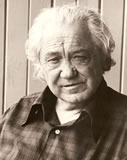Henry Steele Commager Memorial Service
Remarks by Tom Gerety
Remembering Henry
Henry Steele Commager died March 2, 1998, he was 95. His obituary and selected contents of his Memorial Service are here.
Welcome one and all - to Mary, the Commager family, distinguished colleagues, students of Henry Steele Commager, Trustees of Amherst College, members young and old of the Amherst family. We gather to celebrate a man who, in his life and work and engagement with the world, personified those values of what I might call "fighting scholarship" that we at Amherst think are the heart and soul of the place.

Henry Steele Commager
Henry Steele Commager came to Amherst College as a convert in his middle age, as it were, rather than at the outset of his academic career; and,as is frequently said of converts, this only confirms us in our faith. Of course, I missed the heyday not only of Henry Steele Commager, but of Theodore Baird, and Robert Frost, and many another. Although I am sure, years from now, it will be said that some new Amherst president missed the heyday of many a scholar and teacher here today, I did not entirely miss the Commager experience. Mary may remember that about 15 years ago I worked on a public broadcasting project on the U.S. Constitution. I arrived in town with the television crew and put up in the Lord Jeff, knowing next to nothing about Amherst College except that it was supposedly harder to get into than Harvard. The next morning we trucked off down the street to the house where the Commagers lived until the last couple of years. With a cat traipsing across Henry Steele Commager's shoulders, he took us through his sense of Article III of the Constitution and the debates about the Constitutional Convention. Those two or three hours of interviews, later edited in a series hosted by Judy Woodruff and me, were the highlight both for the cameramen and for me. It was my one chance to see Henry Steele Commager in a guise that, I know from traveling among alumni of Amherst College, is the guise in which they most remember him: that is, not just as the fierce and brilliant lecturer, but as the warm conversationalist sitting in his book-lined study with that particular cat, or perhaps one of its predecessors in the feline world, traipsing across his shoulders.
I welcome you all to the celebration of the life of a man who was one of America's greatest teachers and scholars and who, certainly for Amherst College, represented and still represents an ideal of scholarship, of teaching, and of engagement with the world.
